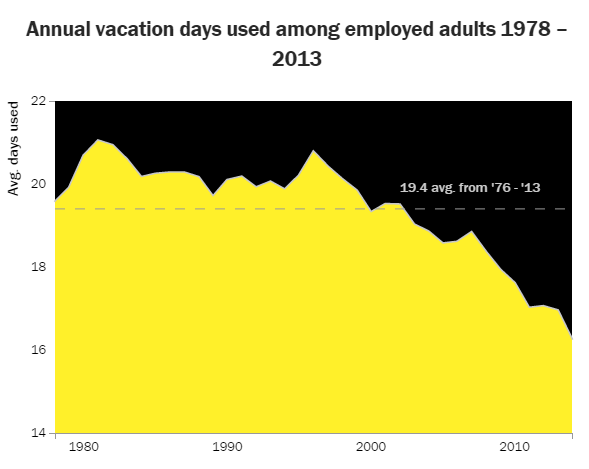The United States of Vacation Elimination

In 1983, the year that Chevy Chase loaded his movie family into the Griswold’s station wagon in National Lampoon’s Vacation, Americans took an average of 20 vacation days. Now, the youngest member of the Griswold family is back on the big screen in 2015, this time taking his own family on a vacation. If Americans’ recent use of paid time off is any indication, reports suggest he’ll see a more open road than his father. Plummeting to an average of 16 vacation days in 2013, the time that Americans spend away from work has fallen precipitously over the past decade. And neither workers nor employers are benefiting from this marked decline.
Source: Project Time Off, Oxford Economics, 2014
You Need a Vacation
Occasionally escaping daily routine is central to both the physical and mental health of employees, and taking time off has been proven to boost work performance and productivity. A 2011 Harvard Medical School study found that sleep deprivation costs American companies $63.2 billion a year in lost productivity. Ernst & Young conducted an internal study of its employees in 2006 and found that for each additional 10 hours of vacation employees took, their year-end performance ratings from supervisors (on a scale of one to five) improved by 8%. What’s more, retention rates were significantly higher among vacationers.
Wish You Were(n’t) Here
Given that the Center for Economic Policy and Research reports that the United States is the only advanced economy in the world that does not guarantee its employees paid time off, it’s unlikely the use of vacation days will increase without some type of policy reform. With American employers not legally required to give workers either paid vacation time or paid holidays, a high number – 77% of private sector companies offer paid time off and paid holidays as part of employee compensation packages. Not surprisingly, though, as employee wage increases, so does the likelihood that they will receive time off; half of low-wage workers typically receive paid time off whereas more than 90% of high-wage workers receive paid time off.
Unplug and Unwind
Harris Interactive reports that people like the idea of more time off. Specifically, 50% of workers who receive paid vacation time in the top 10 cities in the US say they would be willing to sacrifice a workplace benefit for more paid time off. Ironically, although employees say they want more time off, 57% don’t take off the time they already receive. Each year there are 175 million vacation days which American workers are entitled to which are not taken. Even when employees actually do use their time off, they don’t spend the time unplugged. 47% of respondents in a recent survey by Pertino reported that they feel less stressed on vacation if they can stay connected to the office. The same study found that 59% of Americans regularly work, check email, take a phone call, and do other work related tasks while on vacation. But, aside from increased productivity upon their return, employers have another incentive to encourage employees to unplug while away. The Pertino survey found that 77% of those who work on their vacation do not have access to their office network. Because of this, employees use unsanctioned or unsecured cloud services (32%) and/or bring their work computers and files with them on vacation (35%). Public Wi-Fi hotspots are commonly used by vacationers, creating an opportunity for company data and/or log-in credentials to be stolen.
While there are certainly many factors at play in the 2013 job satisfaction study published by the non-profit research group Conference Board, it’s worth noting that back in 1987, when the average American worker took 20 days of vacation, job satisfaction stood at over 61%. Now that Americans have cut back on days away from the office, job satisfaction hovers slightly above 50%. There’s no definite way to tell if Americans could move the needle of job satisfaction by loading up their cars and hitting the open road, but it’s a good start. Let’s start making vacations work for us.
Fronetics Strategic Advisors is a leading management consulting firm. Our firm works with companies to identify and execute strategies for growth and value creation.
Whether it is a wholesale food distributor seeking guidance on how to define and execute corporate strategy; a telematics firm needing high quality content on a consistent basis; a real estate firm looking for a marketing partner; or a supply chain firm in need of interim management, our clients rely on Fronetics to help them navigate through critical junctures, meet their toughest challenges, and take advantage of opportunities. We deliver high-impact results.
We advise and work with companies on their most critical issues and opportunities: strategy, marketing, organization, talent acquisition, performance management, and M&A support.
We have deep expertise and a proven track record in a broad range of industries including: supply chain, real estate, software, and logistics.





Add Comment